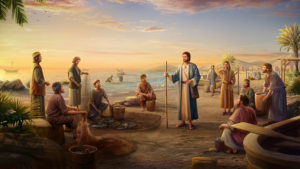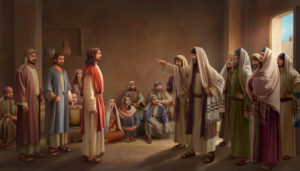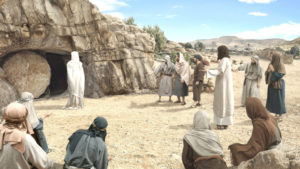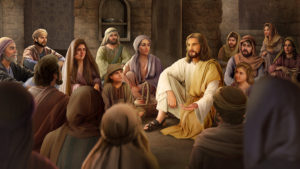Posted by Roberta Grimes • February 09, 2019 • 14 Comments
Jesus, The Source, The Teachings of Jesus, Understanding Reality
 Some who have been reading this series have told me they were eager to see how I was going to describe the advent of the kingdom of God on earth. And I was eager to see that too! I was game. I boldly set fingers to keyboard, but then I realized there were a few more things that you and I should talk about first. As Jesus tells us in the Gospels, if we hope to bring the kingdom of God on earth we must first get rid of all fear-based religious ideas, and we probably will need to escape every religions-based notion altogether. For certain, we will need to replace that judgmental and cranky human-made God with the perfectly loving Spirit that Jesus reveals to us in the Gospels. If you haven’t read those three previous blog posts, please do that before you read this one so we can explore some further truths together!
Some who have been reading this series have told me they were eager to see how I was going to describe the advent of the kingdom of God on earth. And I was eager to see that too! I was game. I boldly set fingers to keyboard, but then I realized there were a few more things that you and I should talk about first. As Jesus tells us in the Gospels, if we hope to bring the kingdom of God on earth we must first get rid of all fear-based religious ideas, and we probably will need to escape every religions-based notion altogether. For certain, we will need to replace that judgmental and cranky human-made God with the perfectly loving Spirit that Jesus reveals to us in the Gospels. If you haven’t read those three previous blog posts, please do that before you read this one so we can explore some further truths together!
As I have sought a deeper understanding of the Lord’s Gospel message, I have developed a habit of checking the work of various Biblical scholars; so this week I looked at how Christian scholars have interpreted the Lord’s Gospel words about the kingdom of God. To be frank, what I have seen confounds me. Surely someone in two thousand years must have considered the Lord’s Gospel words to be important in and of themselves? Yet every interpretation of the Lord’s teachings I can find that talks about His bringing the kingdom of God on earth has been built on and mixed with Christian religious ideas. No one ever seems to have tried to hear those words as the earliest followers of Jesus heard His words. No one has sought to understand what was in the Lord’s mind as He was speaking them.
The only way what all these Christian scholars are doing could make any sense would be if God and Jesus had planned out the details of modern Christianity even before Jesus came to earth. But that would be inconsistent with a lot of what the Lord says in the Gospels! And if He came to start a new religion, why did He never through four whole Gospels come out and plainly tell us that? Instead, He spoke against religions! And there was no recognizable Christian religion for hundreds of years after His death. Furthermore, we never can forget the fact that the multitudes who are not actually dead now tell us in the strongest terms that every Christian dogma is plain nonsense. They insist that the death of Jesus on the cross has never made an afterlife difference for a single human being. (That fact is so well established by now that perhaps it is time for us to engrave those words on a coffin-lid and finally inter the old Roman Emperors’ human-made and sadly fear-based Christianity?)
Gospels! And if He came to start a new religion, why did He never through four whole Gospels come out and plainly tell us that? Instead, He spoke against religions! And there was no recognizable Christian religion for hundreds of years after His death. Furthermore, we never can forget the fact that the multitudes who are not actually dead now tell us in the strongest terms that every Christian dogma is plain nonsense. They insist that the death of Jesus on the cross has never made an afterlife difference for a single human being. (That fact is so well established by now that perhaps it is time for us to engrave those words on a coffin-lid and finally inter the old Roman Emperors’ human-made and sadly fear-based Christianity?)
So indeed it may be, dear wonderful friends, that you and I are breaking new ground. Amazingly, we are among the first people in two thousand years of history to seek to sit at the feet of the Lord and hear His Gospel words without a beliefs-based overlay.
How did Jesus Himself believe that the kingdom of God on earth would look? As Jesus was just beginning to teach, “He came to Nazareth, where He had been brought up; and as was His custom, He entered the synagogue on the Sabbath, and stood up to read. And the book of the prophet Isaiah was handed to Him. And He opened the book and found the place where it was written, ‘The Spirit of the Lord is upon Me, because He anointed me to preach good news to the poor. He has sent Me to proclaim release to the captives, and recovery of sight to the blind, to set free those who are oppressed, to proclaim the favorable year of the Lord.’ And He closed the book, gave it back to the attendant and sat down; and the eyes of all in the synagogue were fixed on Him. And He said to them, ‘Today this Scripture has been fulfilled in your hearing’” (LK 4:15-21).
This Gospel passage is astounding! Here Jesus lays out right at its start what He  sees as His public mission, and to do it He uses words that had been written eight hundred years before. Words that clearly He had chosen to read before He ever entered that synagogue. Nowhere does He talk about our sinfulness, or mention that He was planning to sacrifice Himself in order to redeem us. No, we can have no doubt that He was focused from the start of His ministry on bringing the kingdom of God on earth!
sees as His public mission, and to do it He uses words that had been written eight hundred years before. Words that clearly He had chosen to read before He ever entered that synagogue. Nowhere does He talk about our sinfulness, or mention that He was planning to sacrifice Himself in order to redeem us. No, we can have no doubt that He was focused from the start of His ministry on bringing the kingdom of God on earth!
So, what can you and I tease out of these words that we hear this unknown young man speak as we sit in that synagogue long ago? He is quoting scripture, so we realize He might not have meant every one of those words, although I suspect that He did mean them all. Let’s look more closely at what His words might have meant to Him as He was saying them:
 Healing the sick, the lame, and the blind is a constant theme of the Lord’s ministry, but what is less often noted is the fact that He keeps stressing to those He heals that it is their own minds that have effected their healing!
Healing the sick, the lame, and the blind is a constant theme of the Lord’s ministry, but what is less often noted is the fact that He keeps stressing to those He heals that it is their own minds that have effected their healing!So Jesus began His work by proclaiming that His mission was to transform humankind. He intended to create a world in which all these wonderful outcomes would unfold together! This is the result that Jesus expected His teachings to produce: this is how He foresaw the kingdom of God developing as it overspread the earth. He told us we should pray for it, and in that same prayer He revealed that the kingdom of God would be God’s will done perfectly on earth. He said that we are to pray, “Your kingdom come. Your will be done, on earth as it is in heaven” (MT 6:10). And again He said, “Not everyone who says to me, ‘Lord, Lord,’ will enter  the kingdom of heaven, but only he who does the will of my Father who is in heaven will enter” (MT 7:21). He thereby further emphasized the fact that it is only our obeying God’s will that can bring the kingdom of God on earth. And what is God’s will that we are to obey? He lays it out repeatedly, through all four Gospels! This may be the best example:
the kingdom of heaven, but only he who does the will of my Father who is in heaven will enter” (MT 7:21). He thereby further emphasized the fact that it is only our obeying God’s will that can bring the kingdom of God on earth. And what is God’s will that we are to obey? He lays it out repeatedly, through all four Gospels! This may be the best example:
“But I say to you, do not resist an evil person; but whoever slaps you on your right cheek, turn the other to him also. If anyone wants to sue you and take your shirt, let him have your coat also. Whoever forces you to go one mile, go with him two. Give to him who asks of you, and do not turn away from him who wants to borrow from you. You have heard that it was said, ‘You shall love your neighbor and hate your enemy.’ But I say to you, love your enemies and pray for those who persecute you, so that you may be sons of your Father who is in heaven; for He causes His sun to rise on the evil and the good, and sends rain on the righteous and the unrighteous. For if you love those who love you, what reward do you have? Do not even the tax collectors do the same? If you greet only your brothers, what more are you doing than others? Do not even the Gentiles do the same? Therefore you are to be perfect, as your heavenly Father is perfect” (MT 5:39-48).
It is clear from what He says in the Gospels that Jesus expects the almost immediate advent of the kingdom of God on earth. “Now after John (the Baptist) had been taken into custody, Jesus came into Galilee, preaching the gospel of God, and saying, ‘The time is fulfilled, and the kingdom of God is at hand; change your mind and believe in the gospel’” (MK 1:14-15). Of course, theologians dispute the fact that Jesus meant that literally. They try to retro-engineer Christianity back into the Gospels, even though the formal religion began long centuries after Jesus died. And there can be no doubt that Jesus Himself intended to begin the process of bringing the kingdom of God on earth right now. He said, “The Law and the Prophets were proclaimed until John; since that time the gospel of the kingdom of God has been preached, and everyone is forcing his way into it” (LK 16:16). He said, “The time is fulfilled, and the kingdom of God is at hand; change your mind and believe in the gospel” (MK 1:15). He even said, “But I say to you truthfully, there are some of those standing here who will not taste death until they see the kingdom of God” (LK 9:27).
the gospel of the kingdom of God has been preached, and everyone is forcing his way into it” (LK 16:16). He said, “The time is fulfilled, and the kingdom of God is at hand; change your mind and believe in the gospel” (MK 1:15). He even said, “But I say to you truthfully, there are some of those standing here who will not taste death until they see the kingdom of God” (LK 9:27).
Jesus came to us directly from the Godhead with the mission of bringing the kingdom of God on earth in the decades after His death, and He gave to His mission everything He had! So why did it all go so wrong? We’ll talk about that next week.
Hi again Roberta!
I need to say again that I am really looking forward to your book, in which I believe you said you will explore all of this quite deeply. My whole life I have imagined what it would have been like to have known Jesus. I mean, known him, as a teacher, as a brother, son, friend. The way the disciples and his family and townspeople knew him. There are hints in the Gospels of his real personality. As my son once said, he must have been ver smart. But he was also a great conversationalist, we can see that in his conversation at the well, the accounts (though they lack details) of his dinner gatherings and other “glimpses.” The child prodigy artist Akiane (who is no longer a child) after having visions of Jesus, said “I really really like him.” I can just imagine what listening to his ideas, as a poor Jew or other Roman citizen accustomed to a certain way of seeing the world and people in my life, must have felt like. He first and foremost would have to be likable and approachable. Anyway, here’s to waiting for the next blog entry …
I hope the book doesn’t disappoint you, Mike! It goes deeply into His teachings and what He came to earth to do and how we can begin to do it now and why that is a good idea, but it doesn’t focus as much on Jesus the person as I am focusing now . It will be out in April. I have been the holdup, since they want me to proof some things and I keep saying, “Get in line!” Its subtitle really says what it is about: “Embracing the Christianity That Jesus Taught.” There is already interest in perhaps actually starting the Lord’s movement online – beside Christianity and not in opposition to it, just as Jesus started it the first time beside Judaism and while insisting it was possible to be an observant Jew and also to follow the Way.
Ever since Liberating Jesus, which I channeled four years ago this coming spring, I have been seeking to ever better know Jesus as an individual. I know Him as a part of the Godhead, that overwhelmingly intense presence that used me as a word-processor (not that I minded!), and then later that summer I was granted the memory of having met Him during one of my nightly meetings with my guides in our conference room. Apparently for Jesus to be there was a big enough deal for them that they wanted me to know about it!
What I am trying to understand a bit now, and what I might blog about in a few weeks, is the Lord’s journey. We understand now that God is a collective of perfected people, and we are told that Jesus “came from the highest aspect of the Godhead,” but what prompted Him to do what He did? Who was He before He came to earth in that amazing way? Who was He thereafter? I have been given the gift of knowing Him now, but that very young man who 2000 years ago read in the synagogue, who called His disciples and tipped over the tables of the money-changers and planned how the kingdom of God on earth would unfold and Who (we are told) spontaneously made the tough decision to die in a horrible and public way so He could prove to us that life really is eternal… He was a very different and touchingly human young man who did in all in His early thirties. So, what was His journey? What might you and I learn if we could better understand it?
I can’t imagine the book could disappoint! Can’t wait to read it.
It is clear that Jesus’ life and teachings were twisted and contorted by those in power to gain control. It is impossible to gain control of a large group of people without instilling fear. Just look at the history of the inquisition and the persecution and torture of the Hugenots and many other religious groups who dared to have minds of their own. Once people demonstrate that they have a different view of anything, no matter how small the difference, those who are in power, feel a need to stop them at any cost, so that the fear can continue to exist
Oh yes, dear Lola, very well said! The first seven Christian councils were called by or presided over by emperors, for heaven’s sake: from Nicaea in 325, and perhaps even before that, the Christian religion always has been about fear, power, oppression, and control. It served that purpose very well for its emperor patrons, and it has served the masters ever since! What is wonderful, though, is that they never noticed these gloriously subversive words of the original Jesus that for 2000 years have lain safely buried in the cellars of the edifice that Christianity became. So now, as that edifice crumbles, the entirely love-based movement that Jesus came to start can at last begin!
Gleefully waiting for your next blog! I’ve been trying to make sense of Christianity for years!
Oh yes, dear Anne! I think many of us have, but until pretty recently I never imagined that there was so much sense that could be made of Christianity!
It’s such a shame that so many people had to suffer and die over this. If they faced reality centuries ago, how different the world would be now.
Dear Lola, I have thought about this so much! Every single day for awhile. Knowing how much pain all the false versions of Christianity have caused, and how tragically they have sown ever more fear in the already too-fearful world, for a long time I looked to God for answers. I looked to Jesus. Sometimes I even railed at them! But I have come to see as I have gone more deeply into the broad ways in which what is being done now in the world by those that we used to think were dead all intersect with the Gospel teachings of Jesus – more about this in just a few days – I am coming to understand that while God will not impose God’s will on the world, in the long arc of history, God will ensure that love triumphs. Not by reaching down some holy hand, but rather by working through you and me. Love will triumph! We will have a lot more to learn about this once we get home; but for now, for me, seeing this truth has been enough.
Hi Roberta,
I loved this post and am waiting, keeping a sharp eye out for Part 2. There is so much ‘behind’ the economy of words in what you say. I find it helpful to sit with these blogs for a day or so, before responding.
I’d just like to say that I adore your image of the Divine, the Collective, as a million infinately loving grandmothers (in rocking chairs no less!) knitting the booties of our lives. Also the million infinately loving, protective grandfathers scattering away the demons of our fears etc.. (IE: As written in your reply to the lovely Gerda last week.)
What a beautiful image of God! It is, of course, the gentle and effective antidote to the deep conditioning of a stern, sometimes loving but often punishing god sitting in judgment. This image really helps to dispel ignorance and fear. I’ve kept that celestial description with me all week! It works well for me.
It struck me, while reading your blog, what Jesus has done by declaring the words of Moses with one change:
Moses said: ‘And you shall love the Lord, thy God, with all thy heart, all thy soul and all thy might.’
Jesus said: ‘And you shall love the Lord, thy God, with all thy heart, with all thy soul and all thy MIND.’
I kind of got why.
Jesus came to tell us that our mind is powerful. That our mind holds the answer and it is who we are (consciousness, spirit). It’s what we do with our consciousness that makes all the difference.
Now all those Judeans, running around in the long robes, steeped in their tradition, would have clearly seen that change in this (key/ important) Mosaic Jewish declaration. It would have caused them to stop and reflect. I’m sure it scared some of them…
And the freedom thing: Jesus said he came to free the captives and make the blind see and to bring his message to the poor.
Yes, he mentioned the forgiveness of the Jubilee year, where contractual slaves were freed and debts were ‘forgiven. It’s the reset button; the new start or rebirth. The whole thing is about forgiveness, isn’t it !? And freedom.
I thought, nowadays who are the blind? the captives? the poor? His words resonate for me. Maybe it’s us. People today are blind to the truth that we are eternal beings, that spirit or mind can grow us to higher levels; to the Kingdom of God.
In a way we are poor, living in a blind material civilization and captives of our fear of death or of being unworthy of God’s love…
I await part 2 with alacrity, dear Roberta. And I wonder how the Kingdom will arrive and what form it will take.
Maybe, the awakened souls are the leaven in the bread; being few but enough to make everything rise. Maybe the Kingdom of God is us. The human collective becoming simpatico with the Divine Collective.
Maybe, in a way, the Second Coming is us. The Messiah is all of us.
I don’t know, but I’ll skip the Armageddon cult thinking, and focus on the Kingdom being on earth as it is in Heaven.
I eagerly await your channeling of the next part and I’ll learn more. My heart tells me that your sense of Jesus is real. It feels right. Why would Jesus, ever plagued by religion in his earthly life, turn around and set up a new religion?
Love and hugs,
Efrem
Oh dear Efrem, every word that you say here is wonderful. I hope as many people as possible will read it! YES, we are the modern blind and lame captives, spiritually poor (which is the only poverty that matters). YES, Jesus came to free us from all religious fears, and certainly not to inflict on us even more fears! Your background in Judaism enables you to share with us some wonderful insights, too, and I hope that you will keep those coming. Jesus was and remains a Jew in His earthly form, although He is of the highest aspect of the Godhead. And He is suggesting now that we buy a decommissioned synagogue in which to begin His long-delayed earthly movement, which His first followers called the Way. It might be that He intends to begin His work afresh, as if the past 2000-year detour into horror never happened at all!
quote: “…It might be that He intends to begin His work afresh…..”
Is there any compelling evidence this is the actual situation, Roberta?
Yes, there is. We’ll be talking about this a bit more next time….
gotcha 🙂